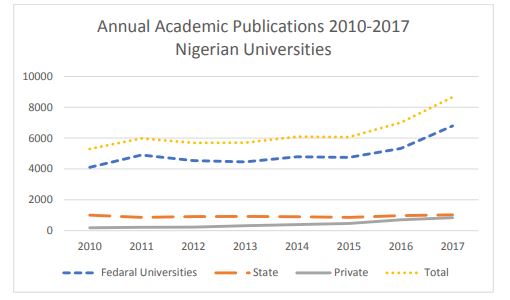Higher education commenced in Nigeria with the establishment of Yaba College in 1932, followed by the founding of the first Nigerian university, the University of Ibadan, in 1948. The Rivers State University of Science and Technology (RSUST) was later established as the inaugural state university in 1980.
Over the final two decades of the 20th century and the beginning of the 21st century, there was a proliferation of state universities. Furthermore, the introduction of Decree 9 in 1993 facilitated the establishment of private universities in Nigeria, resulting in the licensing of numerous private institutions.
Consequently, after nearly a century of continuous academic inquiry in our higher education institutions, it is pertinent to inquire about the quantity and quality of research output. This inquiry is necessary due to prevailing perceptions of a weak research culture, particularly in non-university sectors. Despite the recognition of several academics for their contributions to the international intellectual arena, much of the research is often driven by publication, career progression, and individual intellectual acclaim, with limited societal relevance.
During the 1960s and 1970s, Nigeria witnessed a simultaneous increase in the number of universities and a drive toward industrialization through import substitution. Both endeavors were supported by the oil economy until the late 1970s when the decline in crude oil prices occurred.
The evident deindustrialization by the mid-1980s and the diminishing government support for universities from the late 1970s onwards indicated the vulnerability of both the university system and the import substitution industrialization (ISI) strategy. These developments underscored the inability of Nigeria’s educational and industrial strategies to sustain the economic growth witnessed in the 1960s and early 1970s.
Analysis of University Education in Nigeria
A study titled “An Assessment of Scientific Research in Nigerian Universities” was published in the Journal of Economics and Social Research in 2018. They analyzed the patterns of academic publications in Nigerian universities, including federal, state, and private institutions. An analysis of their findings will offer university administrators in Nigeria valuable insights into the publication trends within their respective institutions.
Moreover, it will also inform policy formulation and implementation aimed at enhancing institutional research productivity. However, additional bibliometric and scientometric studies are required to assess the contributions of African academics to global scholarly publications in a more objective manner and the resulting statistics should be made publicly accessible, and the methodologies used in the studies should be clearly articulated.
It is widely acknowledged that teaching, research, and community service are the primary functions of higher education institutions. For the purpose of this article, these institutions, whether state-owned or private, that offer courses or programs beyond secondary education are included, including universities, polytechnics, monotechnics, colleges of technology, and colleges of education, among others.
These are conveniently categorized into two sectors: the university sector and the non-university or sub-degree sector. According to the NUC, there are 170 universities in Nigeria. As of 2023, 79 were private, federal universities amounted to 43, while state universities were 48. Alongside institutions of higher learning, there are professional and specialized institutions, including over 66 research institutes operating under various federal ministries, such as the Federal Ministry of Science and Technology (FMST), Federal Ministry of Health (FMH), and Federal Ministry of Agriculture (FMA). These research institutes are primarily oriented towards conducting specific or specialized research projects.
The National Policy on Education, National Policy on Science and Technology, and subsequent related policy documents have emphasized the importance of research as an integral component of Nigeria’s national development agenda.
These policies recognize the significant potential contribution of both sectors of the higher education system, along with research institutes, as key hubs of knowledge generation and dissemination. It is evident that the university sector, considered the apex of the higher education system in Nigeria, engages in more research activities compared to the non-university sector, albeit with a tendency towards academic-oriented research in the case of conventional universities.
A comprehensive examination of academic publication trends in Nigerian universities will aid the National Universities Commission (NUC) in fulfilling its vision, mission, and mandate of developing and monitoring research policies for the Nigerian University System (NUS) in alignment with national objectives and requirements. The assessment of the volume, impact, reputation, and influence of academic research conducted and published by universities serves as a key performance metric in global university rankings.
Furthermore, making this information freely accessible will benefit all stakeholders, including postgraduate students, academics, university administrators, industry partners, and the Federal Ministry of Education, in identifying universities with robust research capabilities conducive to fruitful collaborations and partnerships. Additionally, the data presented in this article may facilitate further bibliometric and scientometric studies on university academic performance.

Research Funding in Nigerian Universities
Traditionally, research funding in Nigeria follows a formulaic approach based on inputs such as staff size and enrollment. The overseeing bodies, including the National Universities Commission (NUC), the National Board for Technical Education (NBTE), and the National Commission for Colleges of Education (NCCE), regularly allocate funds for research in federal universities, polytechnics, and colleges of education respectively. Federal institutions of higher learning generally receive better funding and enjoy more autonomy compared to state-owned institutions, given the financial constraints faced by state governments in the context of a challenging global economy.
Recognizing the limitations of input-based funding models, many countries worldwide are shifting towards innovative, performance-based funding mechanisms that emphasize peer-reviewed outputs or outcomes. It is widely acknowledged that robust funding is essential for developing the human capital necessary to drive national transformation through efficient university education funding. In the past, there have been instances where universities received funding slightly exceeding their requests, enabling them to maintain international standards and facilitate the acceptance of Nigerian university graduates into prestigious institutions abroad.
Moreover, research project funds typically come in the form of sponsored research support, endowments, foreign aid, fellowships, and donations from international and charitable organizations. However, there is a noticeable lack of industry contribution to academic research in Nigeria, which further exacerbates funding challenges. Many academics attribute the fundamental issues facing Nigerian public universities to inadequate funding. Insufficient funding has resulted in poor conditions of service, a severe shortage of research and learning facilities for both faculty and students, and a decline in academic staff due to brain drain. The continued underfunding of the Nigerian university system has hindered its progress and contributed to the limited presence of foreign scholars within the system.
Comparison of Research Performance in Nigerian Universities
Presently, there exist numerous abstracting and citation databases dedicated to scientific and technical literature, each employing distinct methodologies. In their research, the Scopus abstracting/indexing database was utilized for analysis. Scopus stands out as the largest database encompassing abstracts and citations of peer-reviewed literature, including scientific journals, books, and conference proceedings.
Providing a comprehensive snapshot of global research output across various fields such as science, technology, medicine, social sciences, and arts and humanities, Scopus offers intelligent tools for tracking, analyzing, and visualizing research. Notably, Scopus boasts an extensive collection of peer-reviewed multidisciplinary publications, including over 5,000 publishers, more than 22,800 serial titles, over 150,000 books, approximately 70,000 main institutional profiles, 70 million items, 12 million author profiles, and a staggering 1.4 billion cited references dating back to 1970.
Their study systematically utilized the Scopus database to retrieve data on the research outputs of accredited Nigerian universities. In 2017, a search was conducted using “Nigeria” as the country of affiliation preference, yielding 171 Nigerian-affiliated results.
The National Universities Commission (NUC) oversees, monitors, and regulates the activities of universities in Nigeria. The accredited Nigerian universities are classified into federal, state, and private categories, totaling 165 institutions, with 32 out of 43 federal universities, 26 out of 47 state universities, and 9 out of 75 private universities indexed in Scopus as institutional affiliations of Nigerian researchers.
A total of 50,504 scholarly articles published by academic researchers from the identified 67 Nigerian universities between 2010 and 2017 were collected from the Scopus database. These data were meticulously organized in a Microsoft Excel Spreadsheet for convenient presentation and analysis.
Drawing from literature in the European Union (EU) and the Organization for Economic Co-operation and Development (OECD), innovation is defined as the transformation of ideas into marketable products or services, new or enhanced production or distribution methods, or new societal service methods.
Notably, innovation leaders rank significantly higher than the EU average in terms of collaborative publications between the public and private sectors, highlighting the interplay between the scientific community and businesses. Generally, developed countries within the EU exhibit high rankings in their ratio of research and development (R&D) expenditures to Gross Domestic Product (GDP).
However, Nigeria faces significant challenges in its higher education research landscape, including poor motivation, inconsistent funding, outdated research infrastructure, insufficient qualified research personnel, a lack of research focus, and limited connections between researchers and the industrial sector. These constraints pose serious limitations to the research capacity and capability of Nigerian higher education institutions.
Bottom Line
The role of Nigerian universities in advancing scientific research is multifaceted and critical for the nation’s development. Beginning with the establishment of Yaba College in 1932 and evolving with the founding of the University of Ibadan in 1948, the landscape of higher education has seen significant expansion, including the establishment of state and private universities. Despite this growth, challenges persist, particularly in fostering a robust research culture and securing adequate funding.
The analysis of academic publication trends, conducted using the Scopus database, provides valuable insights into the research outputs of Nigerian universities. However, there is a pressing need for additional bibliometric and scientometric studies to comprehensively assess the contributions of African academics to global scholarly publications. Moreover, addressing the funding disparities and improving collaboration between academia and industry are essential for enhancing research productivity and innovation in Nigerian universities.
Overall, while Nigerian universities have made strides in academic research, there remains room for improvement to address existing challenges and harness the full potential of the higher education system for national development.
References
- NERDC (2013). Nigerian Educational Research and Development Council National Policy on Education.
- NUSSD (2017). Nigerian University System Statistical Digest. pp 1-59.
- NUC (2018). National Universities Commission.
- NPST (2012). National Policy on Science, Technology and Innovation.



